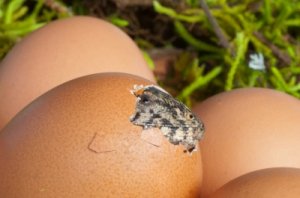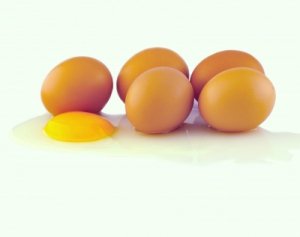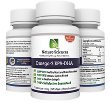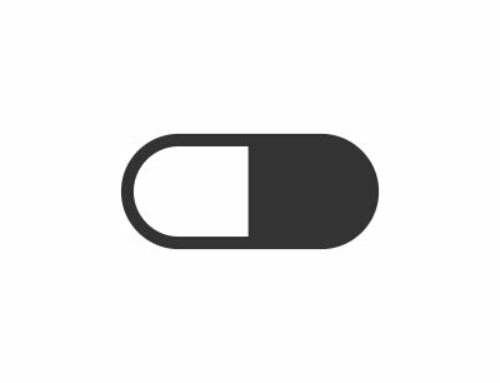If you are over 35 or trying to get pregnant for a longer time (or both!), you probably wonder whether there is anything you could do in order to boost your egg quality.
Are there any foods or supplements which women can take for a certain time which will help them improve their eggs?
Especially those who are in preparation for the next IVF or IUI – delivering good eggs can mean all the difference in the process of getting pregnant.
So what could be seen as the most natural way to improve egg quality? There are several things – simple changes in the lifestyle – that each woman can and should do for her fertility and her eggs. They could be summarized as: supplements, foods, physical activity, and sleep.
In this post I will focus on supplements, because as a biochemist I can best help you out with that. But please keep in mind that all of the factors orchestrate together and you can’t expect best results if you omit any of them.
How can a woman produce better eggs?
Let’s start with basics: maybe you’ ve heard of DHEA and would like to try supplementing it?
But do you know your should have your DHEA levels checked first?
It would be really you do this before supplementing DHEA (but don’t panic, DHEA is really nothing to be afraid of).
Our adreanal glands produce DHEA every day, because our bodies need a lot of it as it is important in many functions besides the egg quality. DHEA is one of the substances which decline as we age – DHEA peaks in our early 20es and then starts getting less and less…So that even with “strong” supplementation of 75mg DHEA per day it can take 2-5 months to come close to the level which a woman had some years back, when whe was not supplementing at all…
I was personally taking 100mg DHEA for several years (with a few months break every now and then), but most DHEA-studies were done with 50-75 mg and that is why I would recommend to stick to published and proven protocols and take 25mg DHEA 3x/day.
DHEA should be taken for at least 2-5 months (without stopping anywhere inbetween as the effects get washed out quite quickly). As the matter of fact, in some women DHEA may need even up to 5 months to reach its peak benefits.
The CoQ10 should be in the form of Ubiquinol as other forms do not absorb well. The best studies published so far had success with 600mg CoQ10 daily, but given that the supplement is expensive, I think that 200 mg CoEnzyme Q10 (Ubiquinol) twice daily, will do exact the same job.
Omega-3 Fish Oil: 640mg 1-2x per day (but do change provider now and then because fish oil varies greatly in quality).
Vitamin D-3: 2000-5000iu 1x per day (I personally don’t supplement during summer months, this really depends on where you live).
Many women like to add a few more substances, like Vitamin E (400IU/day), Myo-Inositol (3-4 grams/day), Royal Jelly, or even baby-Aspirin.
Though they may work (or augment the effect of other components in some cases), I would not recommend taking them as they are either quite special for a particular subset of women with PCOS (like Myo-Inositol), or there is simply no clear scientific evidence behind their benefits in terms of improving egg quality (like baby-Aspirin).
What else?
Yes – as you work on improving quality of your eggs, you may want to ask your partner to consider taking a few supplements himself, so that together you will improve chances of having good embryos. A lot of recent research is proving that men have a “biological clock”, too. In other words, if you’re considering natural ways to improve egg quality and fertility, consider including your male partner as well.
Good luck to all, and remember: Whether or not you succeed in becoming a mother, is not a reflection of you as a human being. You’re fabulous, talented, and wonderful. So be good to yourself, this may be one of the hardest times in your life.
Supplements which are scientifically proven to increase egg quality
(DHEA, CoQ10, Vitamin D3, Omega-3)
Useful books about fertility and improving egg quality
References:
- Candito M, Rivet R, Herbeth B, Boisson C, Rudigoz RC, Luton D, Journel H, Oury JF, Roux F, Saura R, Vernhet I, Gaucherand P, Muller F, Guidicelli B, Heckenroth H, Poulain P, Blayau M, Francannet C, Roszyk L, Brustié C, Staccini P, Gérard P, Fillion-Emery N, Guéant-Rodriguez RM, Van Obberghen E, Guéant JL. Nutritional and genetic determinants of vitamin B and homocysteine metabolisms in neural tube defects: a multicenter case-control study.Am J Med Genet A. 2008 May 1;146A(9):1128-33.
- Dominguez-Salas P, Cox SE, Prentice AM, Hennig BJ, Moore SE. Maternal nutritional status, C(1) metabolism and offspring DNA methylation: a review of current evidence in human subjects.Proc Nutr Soc. 2012 Feb;71(1):154-65.
- Forster DA, Wills G, Denning A, Bolger M. The use of folic acid and other vitamins before and during pregnancy in a group of women in Melbourne, Australia.Midwifery. 2009 Apr;25(2):134-46.
- Hammiche F, Laven JS, van Mil N, de Cock M, de Vries JH, Lindemans J, Steegers EA, Steegers-Theunissen RP. Tailored preconceptional dietary and lifestyle counselling in a tertiary outpatient clinic in The Netherlands.Hum Reprod. 2011 Sep;26(9):2432-41.
- Monteagudo C, Mariscal-Arcas M, Palacin A, Lopez M, Lorenzo ML, Olea-Serrano F. Estimation of dietary folic acid intake in three generations of females in Southern Spain. Appetite. 2013 Aug;67:114-8.
- Nehra D, Le HD, Fallon EM, Carlson SJ, Woods D, White YA, Pan AH, Guo L, Rodig SJ, Tilly JL, Rueda BR, Puder M. Prolonging the female reproductive lifespan and improving egg quality with dietary omega-3 fatty acids. Aging Cell. 2012 Dec;11(6):1046-54.
- Steegers-Theunissen RP. Preconception folic acid treatment affects the microenvironment of the maturing oocyte in humans. Fertil Steril. 2008 Jun;89(6):1766-70.















